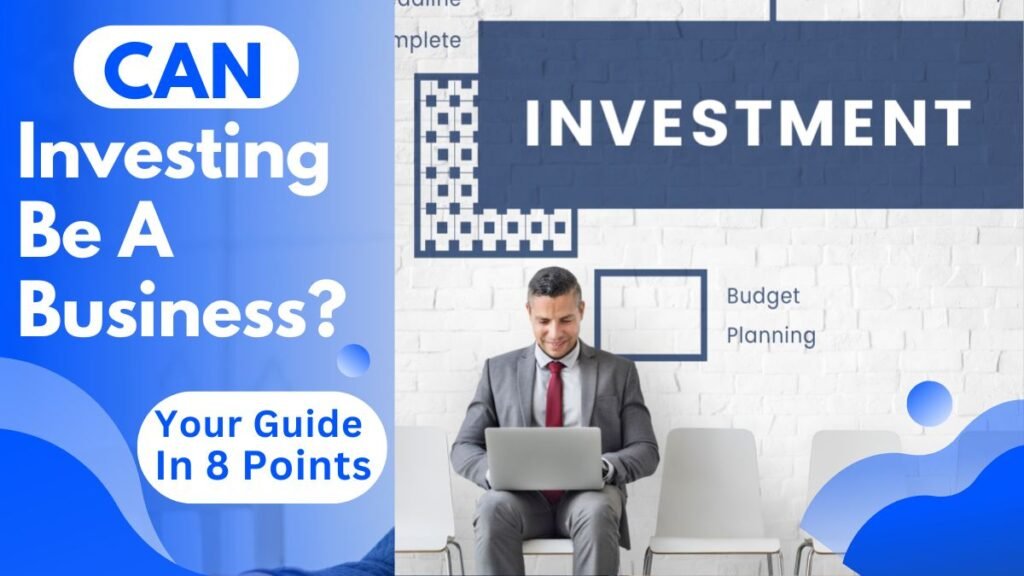
When You get your first salary or paycheck, a random piece of advice comes too- save some of it, invest it. Right!
Meanwhile, you have no idea how and where to invest your hard-earned money to capitalize on it.
This feels annoying and sometimes incompetent as others around you are doing good if not great in investment and gaining profit.
And somehow this makes us invest our money in something suggested by someone. That leads to a loss in most of the cases.
Refuel your hope now.
Investing is like any other skill. the more you read, see, and know it, the more you will get it. That’s why it is important to know terms related to finance, especially investment.
Here we are going to provide you with the basics of investment and essential knowledge related to ‘How To Learn Investing? in 8 Steps’.
Here is your Road to Redemption.
Let’s dive in.
Investing is nothing but simply saving your capital and increasing its value for the future than it was originally when put in.
Investments are made in the great hope that it will return good rewards in future. So the value of money is protected over time against Inflation.
Let’s simplify more,
It either remains with the same value (highly unacceptable from an investing point of view) or increases its value/power of purchasing than it was before (highly expected and appreciated).
What is Investing in Simple Terms?
In simple terms, investing is the process in which you use some or more money to produce profits or another income/source of income.
Investing money is completely way different than saving money. Saving money is the amount you keep aside from your to-be-used money.
It could be in your locker, safe or in a savings bank account with comparatively low-interest gain.
What Are The 7 Types of Investment?
Anything that can be used to generate future income is considered an investment.
Raising a Guard dog to watch for the home, barn, another property or even people for security purposes is also a kind of investment.
In finance, there are many types of investments people make to generate more money.
- Bonds and Fixed-income securities.
- Stocks/Equities
- Mutual funds/Index Funds
- Real state properties
- Commodities (Oil, Gas, Agriculture, Metals, Energy)
- Cryptocurrencies.
- Retirement plans & Insurance policies
Reading is Essential for Investing
 Reading is a good habit to cultivate new skills. It is one of the best tools to understand not just investing but anything from scratch.
Reading is a good habit to cultivate new skills. It is one of the best tools to understand not just investing but anything from scratch.
Especially when you are trying to figure out your quest ‘Where do I start if I know nothing about investing’.
Maybe you will give your ear more to Walt Disney.
There is more treasure in books than in all the pirate’s loot on Treasure Island ― Walt Disney
Not just Walt Disney but All the Great-to-Greatest personalities in the modern age love/loved to read. A lot. This is their way to improve them continuously.
So you shouldn’t even think about skipping this part to learn investing.
But what to read and where from?
I will suggest some of the best and easiest books on personal finance that will increase your appetite for learning investing.
- The Psychology of Money
- The Richest Man in Babylon
- Think and Grow Rich
- Rich Dad Poor Dad
- Common Sense on Mutual Funds
- The Warren Buffet Way
- One Up on Wall Street
- Stocks to Riches: Insights on Investor Behavior
- How to Make Money in Stocks
- The Intelligent Investor
- Common Stocks and Uncommon Profits
If I had been in your place, I would have preferred reading these books in the sequence as shown.
Reason?
The first four books from the top will help you to understand the nature of money, the mindset required for making money and the interest to keep learning personal finance skills.
The rest of the books will teach you and guide you about understanding Company profiles, Equity, Mutual funds, how to read or study them, Fundamental analysis of shares, the modus Operandi of the Stock market and so on.
Learn Financial Terms and Formulas
If you want to play a game, first know the game.
You need to know and understand finance terms such as Net income, Gross profit, Operating profit, and Capital gain.
It will be beneficial to know what is EBITDA (earnings before interest, taxes, depreciation, and amortisation)?, How is stock price determined?
How to know Gross margin and Cash flow,? How to calculate Return on investment (ROI), and Capital expenditure,? What is the net present value, and The Break-even Point? etc.
These are all very important concepts.
Getting acquainted with financial terminologies gives you confidence and a boost of desire to learn investment even sooner.
Plus it will provide you with complete knowledge when you start learning investing.
Does Reading Make You a Better Investor?
When you are exploring all possible solutions of ‘How do I start learning to invest’, reading financial news/magazines or journals is a key to your success.
How is that?
If you are new to the financial market and want to participate actively in investment in the coming days,
Reading financial news/journals will help you to develop a regular reading habit. This habit can significantly contribute to making better investing decisions.
Once you develop the habit of reading financial newspapers and journals.
It provides you with a deep understanding of the economy, knowledge of specific companies, and insights into market trends and events.
What should you read then?
Read The Economist magazine, The Wall Street Journal, Bloomberg Business Week, Forbes and Financial Times with other finance newspapers.
In the context of Indian investors, The Economic Times, Moneycontrol, Live Mint, Business Standard, The Financial Express, and CNBC Awaz are very beneficial.
How Financial Formulas Help in Investing
Understanding the financial formulas and calculations helps you to calculate risk, investments, potential gains and company revenue.
Learning these formulas also enables you to understand the performance of your stocks and track them over time. This is a vital task if you are planning to start to learn about investing.
These formulas improve your skills and qualifications in finance, and help you plan your future needs better.
They also offer you a clear picture of your investing goals, financial progress, and what needs to be done to get to your target.
Free Online Courses to Learn Investing
When you are dealing with ‘Where do I start if I know nothing about investing?’, online courses will do best for you especially when they are FREE! With Certificates too.
Experts from renowned Universities, Academies and Education centres often offer these online courses. These courses are even categorised as beginners and intermediate.
All you have to do is visit their websites and enrol yourself in your desired course.
Coursera offers in-depth knowledge about investing for beginners as well as intermediate-level aspirants with a certificate.
Some of the free courses you can avail of and get benefits are:
1- Investment Management Specialization from the University of Geneva. In this course, you can learn how a wealth-generating investment portfolio functions in practice.
2- Investment and Portfolio Management Specialization from Rice University. This course will enable you to improve your investment strategies with real-world skills, insights, and analytical tools.
65,674 students have already enrolled.
Udemy is another trustworthy platform to learn free online courses. If you are keen to learn the detailed basics of the stock market as a beginner, here you have a good opportunity.
1- Stock Market Investing for Beginners In this course you can learn all the basics of the Stock Market, through comprehensive, interesting and fun lectures.
More than 31,000 have joined this class.
2- 5 Keys To Investing This course provides you with the important 5 key principles required in investing. This course assures students to become better investors in stocks, bonds, mutual funds, ETFs, and Real estate.
Almost 2600 students have enrolled for this.
Alison’s Free Online Investment Courses
For those who want a certificate or diploma along with a free online course, the online education platform Alison is the best match for them.
Alison’s two courses can be a great help for those who are searching for answers to ‘Where can I learn basic investing?’
1- ETF, Index Fund and Mutual Fund Investing. In this course, you will learn how ETFs, index funds and mutual funds work and how to invest in them.
more than 4500 have enrolled for this.
2- Understanding Stock and Bond Investment. According to ALISON,
“This course will teach you the fundamentals behind different investments and intelligent ways to build a financial portfolio, balancing the risks and rewards so your money grows over time”.
These free online investment courses will teach you to learn investing basics properly and enable you to make informed decisions on how to grow your investment in real.
Investment vs Speculation: Do You Know it?
Many of you who are new to finance, might not be aware of the difference between investment and speculation.
Often many people think these two words are similar or interchangeable. Thats Untrue.
Of course, there is a razor-thin difference between investment and speculation. They look almost similar but they are not the SAME!
Both are associated with the Market but their nature are very different to each other.
The same way as Spanish Actor Javier Bardem(L) and American Actor Jeffery Dean Morgan (R).

Interesting! Yeah for me too.
People new to investment and market either intentionally or unknowingly follow speculation to get good returns in a short time, and believe they are doing INVESTING.
and the problem is no one is there to tell them and correct them. which leads them to loss within the first few months and then they find no reason or motivation to keep investing.
You need to know this better if you want to be a good investor.
Some key differences are here:
1- Time horizon, real investors always allocate their money to a specific Stock/Asset for a longer period. While speculators often go for instant gains and allocate their stocks or money for a shorter period.
2- Generally investors don’t get influenced by daily fluctuations in the price of their invested assets. Speculators are influenced frequently by the daily fluctuations in the price of their assets.
3- For an Investor, allocation of money decisions are truly based on the intrinsic value of the Stock/Assets rather than its price. On the Contrary, a speculator always looks at the price of the asset to allocate the money and aims to get some quick reward.
How do Emotions Affect Investment Decision
Emotions are priceless.
And in the stock market, emotions can make investors’ assets price less!
Let’s understand this.
Fear and greed, are two dominant emotions that often drive investment decisions. Amid market downturns fear can lead investors to panic selling and forget long-term investment strategies.
On the other hand, greed plays the opposite role. It can push investors to chase high-risk, high-reward opportunities without being logical and considering potential risks.
So if you start learning to invest, stay away from ‘Emotional Investing’. It can be problematic.
Reasons behind Emotional Investing?
1- Confirmation Bias: As the name tells itself, It happens when we start searching for information, that aligns with our existing beliefs and tends to ignore contradictory evidence.
This confirmation bias can prevent new and experienced investors from evaluating investment options and hinder their ability to make well-researched decisions.
2- The Herd Mentality: This is a psychological phenomenon. In the herd mentality investors or any individual tends to follow the crowd rather than make their own independent decisions.
And then this can result in impulsive actions based on purely social proof, rather than one’s careful analysis.
Following the herd mentality can lead you to poor choices. Not just in investments but in life too! Beware.
Analyze the Stock Market
This is another best way for beginners to learn investing from ground zero.
Now, that you have understood almost all the essentials of how to learn and start investing, it would be wise and necessary to establish a habit of watching the share market.
Beginners in investing are strongly advised to analyze and study the stock market for the basics. It should include the different securities that compose the stock market.
Yes, you can’t be John Cena in the ring of finance and investment, and you are not probably going to win any ‘Best Beginner Investor’ title by just analyzing the share market.
Then, why should you do such a ‘next to boring’ task when you have great options to be occupied like Netflix and social media?
Because watching and trying to analyze the stock market daily will craft you into a better investor over time, even though you are just a beginner now.
The fields that you must focus on include financial definitions, various kinds of investment accounts, timing of investment, methods of selecting stock, order types etc.
What help will you get from this?
When you are gaining a thorough understanding of the stock market gradually, it will ensure that you’re in a good position to assess risks and make the right selection of assets/stocks.
Even with no skill in the share market and prior knowledge of investment, you can do better in investing.
You can know and learn detailed key points here ‘How to invest with no knowledge’ as a beginner.
Let’s first understand how the Stock market works in less than 5 minutes!
Pick the Sectors You Know Well
This is it. Here is your ‘Final Step’ towards your journey ‘Where Do I Start to Learn About Investing’.
The last 7 steps, you have been through will do more than good to you in investing. But if you want to have the upper hand in your investing as a beginner, do one more thing.
Identify your key industries of expertise and interest. Industries that look great to you to read and research. Then find 2–3 companies in each industry, that you can study with little passion.
For example, I have chosen the Energy, IT and Automobile sectors to watch in the stock market.
Use these companies to understand their basic finance, accounting, trends, Profit margin, and balance sheets.
After that add these picked ones to your watchlist on Yahoo Finance or MarketWatch to gain more insights.
Remember, according to Legend Investor Warren Buffet:
“Invest in what you know. Don’t place your money in an area where you’re ‘incompetent,’ at least until you become competent.
Take some time to educate yourself first.”
Final Words
Investing is an art. You achieve craftsmanship in it over time not overnight.
You need to give time and consistency to master it. Here you have learnt all the essential chapters to start investing.
But Seeing a path and walking on it completely are two different things.
Take your first step, and start applying the learning to your life. This way you always improve yourself gradually and feel better.
This is how you choose a life to be creative by taking action or life to feel wasted by thinking and procrastinating.
Because,
What you think is who you are; what you do is who you become.
Note-:
The content is exclusively for educational purposes.
Investments in the securities market are subject to market risks. You must consult your advisor/expert before making financial decisions.
Kindly read all the related documents carefully before investing.


